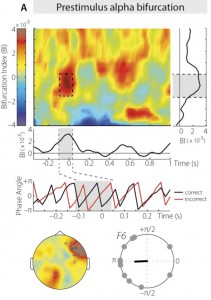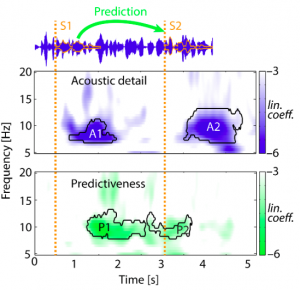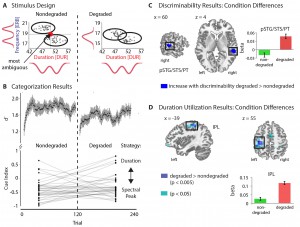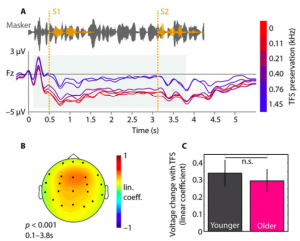Congratulations to just-graduated former AC PhD student and fresh GIPSA/Grenoble Postdoc Antje Strauß, who today had the last data set from her PhD thesis accepted as a paper in The Journal of Neuroscience. We are all very happy!
The paper is entitled “Alpha phase determines successful lexical decision in noise” and contains arguably the first data set to extend principles of (alpha, 8–12 Hz) pre-stimulus phase dependence from low-level psychophysics to more complex language or cognitive processes, here: lexical decision.
A big hello to AC friend and colleague Niko Busch, by the way, whose bifurcation index measure served our purposes very well here!
We will update accordingly, but meanwhile, here is the abstract and my favourite figure from the paper.
Abstract
Psychophysical target detection has been shown to be modulated by slow oscillatory brain phase. However, thus far, only low-level sensory stimuli have been used as targets. The current human electroencephalography study examined the influence of neural oscillatory phase on a lexical-decision task performed for stimuli embedded in noise. Neural phase angles were compared for correct versus incorrect lexical decisions using a phase bifurcation index, which quantifies differences in mean phase angles and phase concentrations between correct and incorrect trials. Neural phase angles in the alpha frequency range (8–12 Hz) over right anterior sensors were approximately anti-phase in a pre-stimulus time window, and thus successfully distinguished between correct and incorrect lexical decisions. Moreover, alpha-band oscillations were again approximately anti-phase across participants for correct versus incorrect trials during a later peri-stimulus time-window (around 500 ms) at left-central electrodes. Strikingly, lexical decision accuracy was not predicted by either ERPs or oscillatory power measures. We suggest that correct lexical decisions depend both on successful sensory processing, which is made possible by the alignment of stimulus onset with an optimal alpha phase, as well as integration and weighting of decisional information, which is coupled to alpha phase immediately following the critical manipulation that differentiated words from pseudowords. The current study constitutes a first step towards characterizing the role of dynamic oscillatory brain states for higher cognitive functions such as spoken word recognition.





